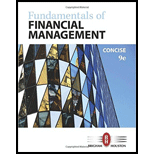
Next, we need to calculate MMM’s cost of debt. We can use different approaches to estimate it One approach is to take the company’s interest expense and divide it by total debt (which is the sum of short-term debt and long-term debt). This approach only works if the historical cost of debt equals the yield to maturity in today’s market (i.e., if MMM’s outstanding bonds are trading at dose to par). This approach may produce misleading estimates in years in which MMM issues a significant amount of new debt. For example, if a company issues a great deal of debt at the end of the year, the full amount of debt will appear on the year-end
Want to see the full answer?
Check out a sample textbook solution
Chapter 10 Solutions
LMS Integrated for MindTap Finance, 1 term (6 months) Printed Access Card for Brigham/Houston's Fundamentals of Financial Management, Concise Edition, 9th
- Alfa international paid $2.00 annual dividend on common stock and promises that the dividend will grow by 4% per year, if the stock’s market price for today is $20, what is required rate of return?arrow_forwardgive answer general accounting.arrow_forwardGive me answers in general financearrow_forward
- General Finance Question Solution Please with calculationarrow_forwardGeneral Financearrow_forwardAs CFO for Everything.Com, you are shopping for 6,000 square feet of usable office space for 25 of your employees in Center City, USA. A leasing broker shows you space in Apex Atrium, a 10-story multitenanted office building. This building contains 360,000 square feet of gross building area. A total of 54,000 square feet is interior space and is nonrentable. The nonrentable space consists of areas contained in the basement, elevator core, and other mechanical and structural components. An additional 36,000 square feet of common area is the lobby area usable by all tenants. The 6,000 square feet of usable area that you are looking for is on the seventh floor, which contains 33,600 square feet of rentable area, and is leased by other tenants who occupy a combined total of 24,000 square feet of usable space. The leasing broker indicated that base rents will be $30 per square foot of rentable area Required: a. Calculate total rentable area in the building as though it would be rented to…arrow_forward
- Don't used Ai solutionarrow_forwardGeneral Finance Questionarrow_forwardConsider the following simplified financial statements for the Yoo Corporation (assuming no income taxes): Income Statement Balance Sheet Sales Costs $ 40,000 Assets 34,160 $26,000 Debt Equity $ 7,000 19,000 Net income $ 5,840 Total $26,000 Total $26,000 The company has predicted a sales increase of 20 percent. Assume Yoo pays out half of net income in the form of a cash dividend. Costs and assets vary with sales, but debt and equity do not. Prepare the pro forma statements. (Input all amounts as positive values. Do not round intermediate calculations and round your answers to the nearest whole dollar amount.) Pro forma income statement Sales Costs $ 48000 40992 Assets $ 31200 Pro forma balance sheet Debt 7000 Equity 19000 Net income $ 7008 Total $ 31200 Total 30304 What is the external financing needed? (Do not round intermediate calculations. Negative amount should be indicated by a minus sign.) External financing needed $ 896arrow_forward
- An insurance company has liabilities of £7 million due in 10 years' time and £9 million due in 17 years' time. The assets of the company consist of two zero-coupon bonds, one paying £X million in 7 years' time and the other paying £Y million in 20 years' time. The current interest rate is 6% per annum effective. Find the nominal value of X (i.e. the amount, IN MILLIONS, that bond X pays in 7 year's time) such that the first two conditions for Redington's theory of immunisation are satisfied. Express your answer to THREE DECIMAL PLACES.arrow_forwardAn individual is investing in a market where spot rates and forward rates apply. In this market, if at time t=0 he agrees to invest £5.3 for two years, he will receive £7.4 at time t=2 years. Alternatively, if at time t=0 he agrees to invest £5.3 at time t=1 for either one year or two years, he will receive £7.5 or £7.3 at times t=2 and t=3, respectively. Calculate the price per £5,000 nominal that the individual should pay for a fixed-interest bond bearing annual interest of 6.6% and is redeemable after 3 years at 110%. State your answer at 2 decimal places.arrow_forwardThe one-year forward rates of interest, f+, are given by: . fo = 5.06%, f₁ = 6.38%, and f2 = 5.73%. Calculate, to 4 decimal places (in percentages), the three-year par yield.arrow_forward
 EBK CONTEMPORARY FINANCIAL MANAGEMENTFinanceISBN:9781337514835Author:MOYERPublisher:CENGAGE LEARNING - CONSIGNMENT
EBK CONTEMPORARY FINANCIAL MANAGEMENTFinanceISBN:9781337514835Author:MOYERPublisher:CENGAGE LEARNING - CONSIGNMENT Financial Reporting, Financial Statement Analysis...FinanceISBN:9781285190907Author:James M. Wahlen, Stephen P. Baginski, Mark BradshawPublisher:Cengage Learning
Financial Reporting, Financial Statement Analysis...FinanceISBN:9781285190907Author:James M. Wahlen, Stephen P. Baginski, Mark BradshawPublisher:Cengage Learning

